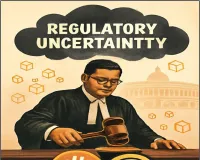Indian Courts Push Back Against Crypto’s Regulatory Void
New Delhi

Indian courts have repeatedly raised the alarm over the regulatory vacuum surrounding crypto assets.
From the landmark Internet and Mobile Association of India judgment to more recent bail and enforcement matters, the judiciary has consistently flagged a troubling reality: India’s crypto sector operates in a legal and supervisory void, with citizens and enforcement agencies bearing the consequences.
Courts vs. Government Inaction
The government’s ambiguous stance on cryptocurrencies has drawn sharp criticism from the Supreme Court. While digital assets such as Bitcoin are taxed at 30%, the Court noted the absence of a clear regulatory framework. Lawmakers, it urged, must strike a balance between taxation and oversight, warning that unchecked crypto growth risks creating a “parallel economy” capable of undermining financial stability.
The Beginning: The 2020 IAMAI Case
The story began in 2020 with Internet and Mobile Association of India v. Reserve Bank of India. At the time, the RBI had imposed a blanket banking ban on crypto. Exchanges challenged the circular, arguing it violated the right to trade under Article 19(1)(g).
The Supreme Court struck down the ban—not because crypto was risk-free, but because the RBI had failed to justify its action with empirical evidence. Importantly, the Court stressed that while a ban may be disproportionate, the sector cannot be left unregulated. The message was clear: oversight, not prohibition, was needed.
Fast Forward: The Odisha Bail Matter, 2023
By 2023, the judiciary’s unease was surfacing in routine proceedings. In a bail matter from Odisha involving crypto, the Bench observed that such cases were “exploding” and exposing the legal system’s unpreparedness. The Court confirmed that trading in crypto was not illegal but emphasized the policy vacuum. Its remarks signaled frustration: if lawmakers refuse to step in, the judiciary will be forced to improvise case by case.
Beyond Individual Cases: Systemic Concerns
In ongoing matters spanning money laundering, tax evasion, and fraud, courts have gone beyond individual culpability to ask systemic questions:
-
How long can a multi-billion-dollar ecosystem remain unregulated?
-
Why aren’t agencies equipped with crypto-tracing tools?
Some Benches have even directed investigative agencies to present technical details of wallets and tracking mechanisms, underscoring the urgent need for capacity-building.
The Larger Message
The judiciary’s undertone is clear. Crypto is no longer just a technological curiosity; it is a rapidly evolving financial ecosystem that cuts across taxation, consumer protection, criminal law, and even international treaties. Continuing to rely on outdated legal tools is untenable.
The Apex Court has described India’s current framework as “obsolete,” urging the government to adopt a modern regulatory regime without delay.



.png)
12.png)
12.png)
.png)
12.png)
